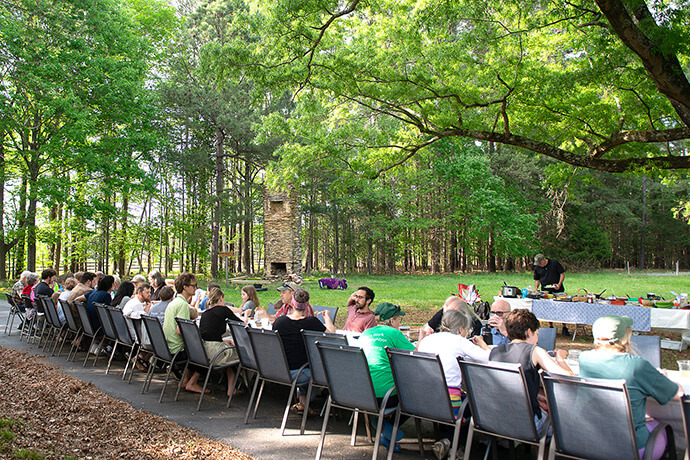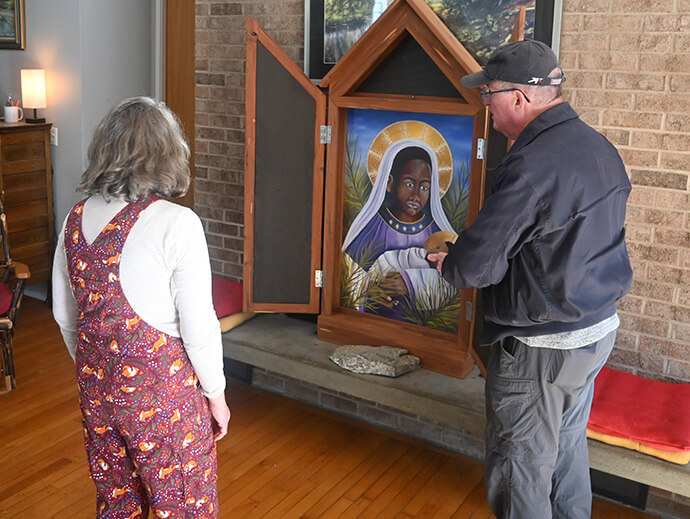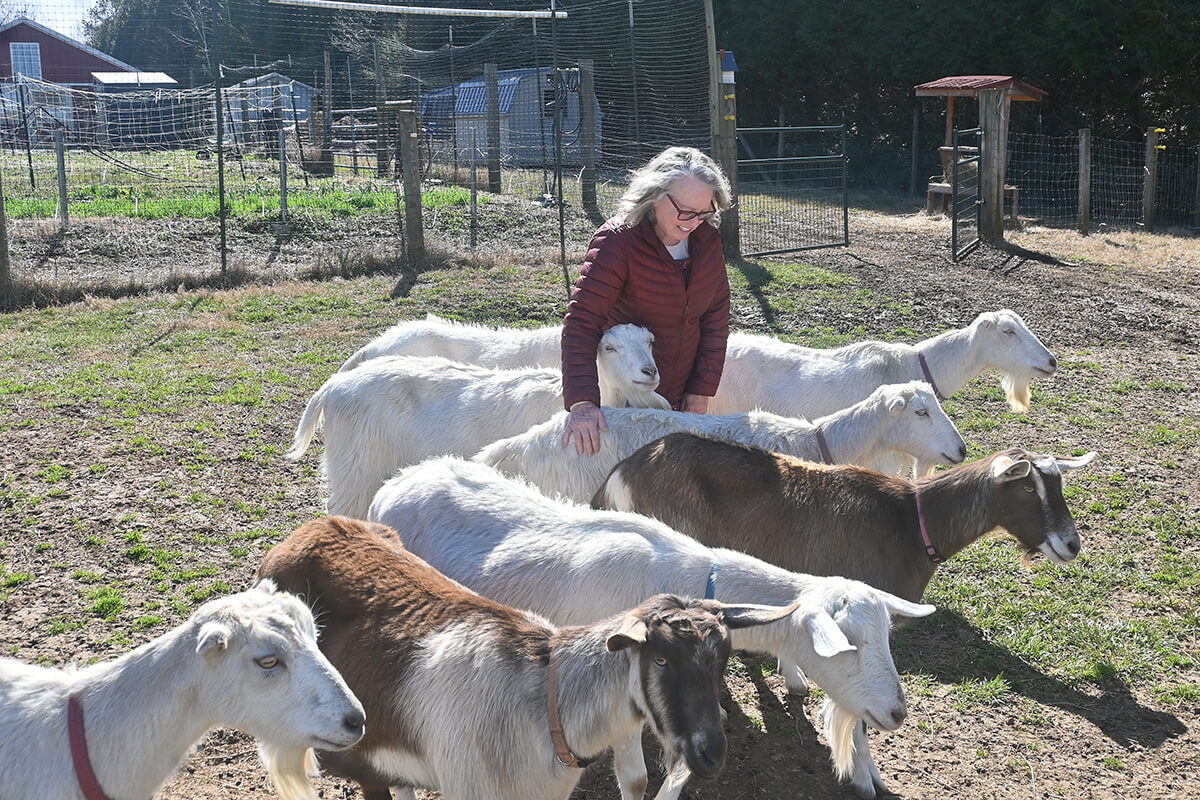Key Points:
- Spring Forest in Hillsborough, North Carolina, is working to become a new kind of Christian community.
- The Rev. Elaine Heath has taken elements of communal farming, church and nunneries and monasteries as inspirations.
- About 12 people live on the property and 12 more are oblates, who participate in activities online and at annual get-togethers.
God’s work can be a small thing, such as getting children to give vegetables a try. Or it can be a whopper, like overcoming alcoholism and homelessness.
Both have happened already at Spring Forest, which is an “intentional faith community.”
What does that mean? It’s a work in progress, with elements of monasteries and nunneries, kibbutzes, retreats, regenerative farming, communes, churches and small businesses.
“When I first started, I’m sure that there were people that thought we were just weirdos,” said the Rev. Elaine A. Heath, a United Methodist elder and founder and “abbess” of Spring Forest, with a chortle. She was sitting in the living room of her home on the 23-acre Spring Forest property, which includes a second house, working farm, stage for entertainment, flock of chicken and herd of goats. There are long tables outside for mass meals.
The second house is the home of other members of the community. Two more residents live in a trailer and a tent pitched onsite, respectively. People come and go, but usually 11 or 12 occupants are living there at any time.
In purple overalls decorated with fanciful cartoons of foxes, Heath, once the dean of Duke Divinity School, seems miles away (physically, it’s a 14-mile drive to campus) from such a stressful executive job. She has had a long and varied career, emerging out of a childhood rife with poverty and family violence. She has pastored United Methodist churches, written at least a dozen books and taught at Perkins School of Theology at Southern Methodist University and Duke Divinity School, which she led for two years.
“We are a new monastic community, and we’re intentionally borrowing from some of the old monastic traditions,” she said of Spring Forest, which is nicknamed “The Farmastery.” “But it’s new. We’re innovating, and we’re doing it in the spirit of the early Methodist movement and the Catholic Worker movement.”

Although it was not started as part of the Fresh Expressions movement, it fits neatly into that concept of doing church in unorthodox places and times.
“Spring Forest is a beautiful embodiment of the Fresh Expressions movement as a spirit-led, community-rooted and missionally imaginative way of being church,” said the Rev. Michael Adam Beck, director of Fresh Expressions of The United Methodist Church. “In many ways, she is a mother of the Fresh Expressions movement in The United Methodist Church, and Spring Forest is one of her many gifts to the Church.”
Another inspiration is Dietrich Bonhoeffer, a Lutheran theologian murdered by the Nazis.
“Bonhoeffer said that the church of the future has to be a new kind of monasticism that has nothing in common with the old, other than radical commitment to live the Sermon on the Mount,” Heath said.

The monastic aspect of Spring Forest plays out in daily rituals, such as an online prayer every weekday at 8 a.m. Eastern time. The organization has about 20 people who participate at each of the morning prayers.
Other activities include a monthly potluck dinner, summer camps for children, retreats and tending to the crops and animals. Vegetables grown on the farm are sold when they are in season. Sunday activities are avoided so as not to compete with church services.
A variety of people in addition to residents participate, including volunteers from nearby Duke Divinity School and elsewhere. There are about 200 people who are regularly involved with Spring Forest's ministries on an average week.
Shanetta Edwards is the staff chef and nutritionist at Spring Forest. One of her favorite duties is engaging children who visit.
“I hear it all the time,” Edwards said. “My kid does not eat vegetables.”
Once she asked who liked red okra and was told they all hated it.
“So we harvested some fresh okra,” she said. “I had made some ranch dressing, and they came back and washed it, dipped it in the ranch and were like, ‘Oh my gosh, this is amazing.’”
The job “allows me to use my gifts,” Edwards said. “But more importantly, it allows me to teach individuals how to provide food for their families at an affordable cost, and how to provide nutrition and … kids’ involvement with it.”
Subscribe to our
e-newsletter
Justin Nygren, who was an ordained Southern Baptist minister from 1998 to 2006, was homeless, battling alcoholism and sleeping in his car when Heath reached out to him, unaware of his dire circumstances. They had worked together on precursor projects to Spring Forest in Dallas, and he had guest-lectured to some of her Perkins classes.
“I lost two businesses during the pandemic lockdowns in 2020, lost my house and lost custody of my kids,” Nygren said. “I was like, I need a place to stay, and so came out here in June of 2023 for kind of a fresh start and to rebuild my life.”
Today, he is sober and works as an office manager and event planner at Spring Forest, as well as helping care for the goats and providing IT support. He is raising money to construct a tiny house on the property and plans to stay there permanently.
“There’s an openness and a vulnerability that comes along with intentional community that you don’t have with people that you just meet with once a week (in church),” Nygren said. “That appeals to me.”
Guidelines to be part of the community — as a resident or remotely — are based on five concepts: prayer, work, table, neighbor and rest. “Table” refers to sharing meals.
The community also has “oblates,” or members, who do not live there.
“It’s very much like (John) Wesley’s early movement,” Heath said. “So the oblates meet on Zoom once a month … checking about how it’s going … and they pray for each other and give each other support. The oblates are committed to supporting the ministry here financially, and to come once a year to a retreat in April.”
There are 12 oblates right now, she said. One is in England.
“There’ll be people from all over the nation that come (in April),” Heath said. “It’s not a large group but is a very committed group of people.”
During the visit, oblates will “eat together, cook together, worship, work on the farm, do something to help with our refugee ministries and just have fun,” she added. “To me, this is what discipleship looks like.”
The hope is that the concept will spread rather than Spring Forest itself growing.
“It has to stay small here because we have limited space,” she said.
But the oblates are free to use the Spring Forest model to start their own version.
“That’s basically 12 different places in the world where people live and are practicing this way of life in their own context,” Heath said. “They don’t all have farms, but a couple of them do have land where they’re growing food, and it’s a small version of this that’s just developing.”
In Lumberton, North Carolina, an oblate couple lives in a mixed income neighborhood.
“They’re just doing wonderful things with their neighbors,” Heath said. “People who voted for Donald Trump on one side of the street and a Black Lives Matter activist is on the other side of the street, and they have barbecues together. I mean, that’s amazing.”
Read related story
Patterson is a UM News reporter in Nashville, Tennessee. Contact him at 615-742-5470 or [email protected]. To read more United Methodist news, subscribe to the free UM News Digests.




